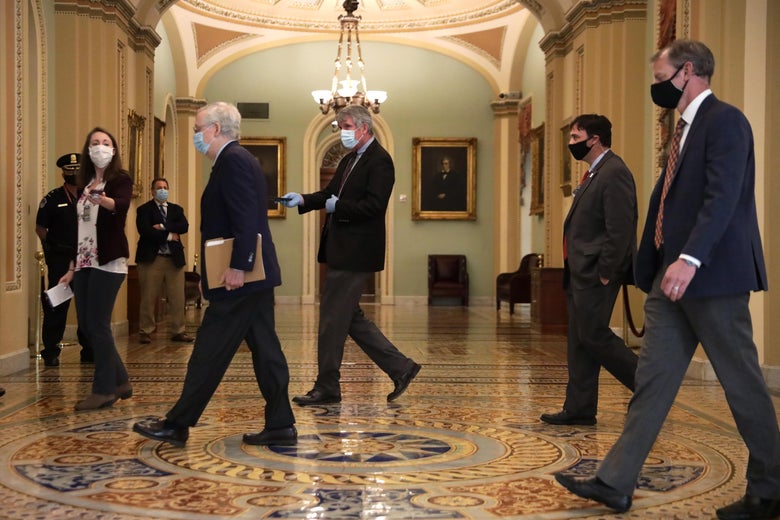
Senate Majority Leader Sen. Mitch McConnell wears a mask as he walks through a hallway at the U.S. Capitol on May 11, 2020 in Washington, DC.
Alex Wong/Getty Images
The Senate returned last week, the same week that the Labor Department announced that 20.5 million jobs had been lost in April and the unemployment rate was at its highest since the Great Depression. The chamber’s Republican leadership, though, reflecting the rough consensus within the Republican conference of the whole, did not spend that time writing additional legislation devoting additional resources to cash-strapped state and local governments, businesses, and human beings in the United States. The leadership of the Republican Party is on a self-described “pause” right now from considering new disbursements of federal relief. The pause could last anywhere from a month to eternity.
As a political matter, the decision to pause is vexing. There is a presidential election in six months in which the Republican incumbent will be running on his record. The last time a Republican incumbent ran on this kind of economic record, Democrats won not just the 1932 election, but dominance over federal policy for the next half-century. Why, then, are Republicans in the Senate, House, and White House turning back now?
The simplest argument is ideology. Repulsion at the sight of big numbers on (the non-military section of) the federal ledger is a real thing for members of the Senate majority. The numbers haunt them. Here is Louisiana Sen. John Kennedy writing the figures “$3,000,000,000,000,” or “$3,000 $Billion,” on a poster on the floor of the United States Senate. When they begin writing thirteen-figure numbers on posters for Senate floor speeches, we know the window for additional action is either closing or closed. When genuinely insulting proposals such as “allowing” Americans to take advances against their Social Security benefits, rather than just cutting a new round of checks, resurface, the door is nearly shut.
But Republicans have never allowed, and would never allow, ideology to supersede winning an election. They might be repulsed by the large numbers, as they were by the cost of Medicare Part D in 2003. But they rammed through the new benefit anyway, through sheer force of will, because then–White House adviser Karl Rove insisted it was necessary for Republicans to win. Concerns about unpaid-for spending, and agonizing lines like “families across the country are cutting back their spending, so the government should, too,” might be foundational notions for them. But they don’t become practicable ideas, for present-day governance, unless Democrats are in power.
Could that be it, then? The shutdown on spending would make sense if they’ve already given up on Trump’s chances at reelection and are instinctually transitioning to handicapping the country that the Biden administration will inherit. Governance has its moments, sure. It’s fun to fill every vacancy on the federal judiciary. But can it really compare to the thrill of handing a collapsed economy to a Democrat, watching that Democrat assume blame for the whole thing, and then winning back the House in two years? When you get to practice your anti-spending ideology and watch as voters blame the Democratic president for it?
It’s plausibly cynical. But Republicans haven’t given up on Trump just yet. Biden has been doing well in national and swing-state polling. He may even be a favorite for November at the moment. He is still, however, a 78-year-old man who is either locked in a Delaware basement or doesn’t know how to get out of it.
But if they still have hope for November why are Republicans “pausing” relief efforts, for now, ahead of a national referendum on their relief efforts? Because—again, for now—they’ve gotten what they wanted.
Between the Federal Reserve going to unprecedented lengths to prop up capital markets, and the CARES Act’s enormous relief for large corporations, the constituencies for whom the Senate Republican conference serves as concierge are taken care of.
Though the Paycheck Protection Program has been far from a perfect success, it’s served areas dominated by small- or medium-sized community banks that already have strong relationships with the Small Business Administration well. Those areas are often red states.
Less-dense red states, similarly, haven’t been as hard-hit by the virus. Of the 20 senators representing the ten states with the highest per-capita number of COVID-19 related deaths, only three are Republicans. And while red states’ budgets aren’t a pretty sight now, either, Republicans have a narrower view of what state and local government services might be considered essential enough to merit federal bailouts. This is why most Senate Republicans are, for now, willing to entertain more flexibility in states’ use of existing federal grants, but aren’t really talking about the additional $500 billion to $1 trillion for which Democrats have been lobbying.
Republicans’ priority, now, is not providing additional relief money as efforts to stamp out the virus continue. It is getting businesses to reopen and commerce to recommence, virus be damned. And if that’s your view, then certainly liability protection for business owners would be your top legislative priority going forward, as it is for Senate Majority Leader Mitch McConnell.
What might snap Republicans from the spending “pause,” though, is when America reopens but Americans stay in their homes. Georgia and Texas moved ahead aggressively with allowing businesses to under certain conditions. That does not mean, however, that commerce has roared back. As long as businesses are operating at limited capacity, and as long as customers are concerned about getting sick and dying from a global pandemic, America’s reopening will be a bust. Without a national test-and-trace system in place—hint, hint!—the money printers are the only way through.
Readers like you make our work possible. Help us continue to provide the reporting, commentary, and criticism you won’t find anywhere else.
Join Slate Plusfrom Slate Magazine https://ift.tt/2SVeYJP
via IFTTT
沒有留言:
張貼留言